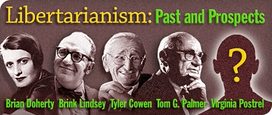Like Tom Palmer, I am “not a pure instrumentalist. I think that being free is a constituent part of a happy life, which is something desirable for its own sake and not for the sake of something else.” Unlike Tom, I’m not a philosopher, so perhaps my language suggested baggage I did not mean to imply. But in my lexicon at least, considering consequences includes—very importantly—considering consequences for liberty.
I also fully agree that an empirical approach is compatible with theory and principles, a point I thought I’d made in mentioning the large number of fine contemporary theorists in the empiricist tradition (not to mention all that talk of Hume and Smith). I reject the equation, common in some libertarian circles, of “principles” with a priori deductivism. Many of the principles we rightly defend as libertarians are heuristics derived from centuries of experience, but that does not make them any less valuable.
In his podcast, Tyler cited Hayek’s The Fatal Conceit in support of his argument that a large welfare state is inevitable. Perhaps his pessimistic conclusion is correct, but the argument is surely wrong. There is no reason to think that humans are biologically wired to consider something as vast and distant as the nation-state an extension of small-group norms. We could just as easily cook up an evolutionary explanation for why localism and private action is more natural than the welfare state. Hayek’s argument is more correct in explaining why people pay attention to visible costs and benefits and ignore less visible ones. The genuine emotional devotion of citizens to their countries and governments is not well explained by evolutionary arguments. Neither is the willingness to trust strangers that is demonstrated every day not only in global markets but in all sorts of Internet communications.
It’s not surprising that a group of libertarian intellectuals tend to focus on intellectual traditions, but I want to reiterate the importance of the libertarian cultural traditions I mentioned in my essay. With their visions of the value of being left alone to construct your own life, these traditions give emotional heft to the arguments and principles developed by libertarian intellectuals. And, despite their limitations, they can be extremely useful policy guides. “They shall sit every man under his vine and under his fig tree; and none shall make them afraid” won’t tell you what to do about air pollution or whether to establish a safety net. But it will tell you that a good society will not allow the government to “disappear” citizens or to take their homes for the use of powerful businesses—both questions that have gone to the U.S. Supreme Court in the past few years. Again, caring about consequences includes caring about consequences for liberty. It is not simply a matter of maximizing financial returns.
Finally, I want to congratulate Brian on his book, which is not only a great achievement of history and story-telling but also a clear labor of love.

